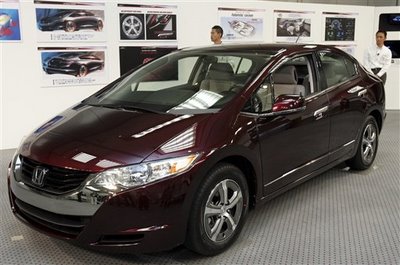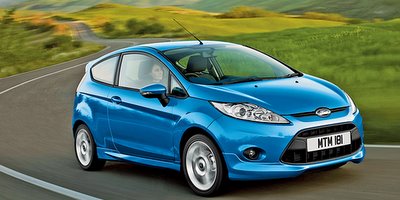Extra buckets for a sinking ship

Pictured at right is The Honda Clarity, a new hydrogen cell fuel car and the reason we the taxpayers are being asked to bailout the auto industry -- failure to innovate.
The Clarity offers the kinds of attributes that would make an advertising executive drool in the current economic climate -- "No emissions, 79 mpg and $600 a month."
If that isn't a recipe for success, I had better go back to riding a horse around town.
But there's a catch. (Isn't there always?) This slick looking model runs on hydrogen. Yes, that far-off technology that Detroit has been telling us can't possibly be designed, much less manufactured, without years of research and millions of dollars of taxpayer-funded incentives.
And yet, here we have it. Already researched, already manufactured and being test-marketed in the most receptive market of all, southern California.
It's called capitalism and the Japanese are kicking our asses at it. And frankly, we deserve the ass-kicking.
It's hard to imagine a more moribund, short-sighted, intellectually defunct or otherwise shiftless industry in America than the one based in Detroit.
America's former auto giants got that way by convincing Americans they wanted something they didn't need just as the words "disposable income" were becoming commonplace.
But once it came to interpreting the market instead of creating it and defining it, we fell behind. In other words, once car companies had to figure out what people wanted instead of telling them what they wanted, they lost their way.
Certainly, their success in making us believe we needed a converted pick-up truck with leather seats just to drive around town, convinced them they still had it. But it what they didn't realize is it was the last hurrah. When the price of running these SUV monsters became too much for even besotted Americans to stomach, Detroit just couldn't convince itself the honeymoon was over.
Which brings us to the present. At the worst possible time, when we would look to them to be a bulwark against what economists are now calling a world-wide recession, Detroit has its hand out.
As New York Times columnist Thomas Friedman, whose new book on the future is titled "Hot, Flat and Crowded," ranted in the Nov. 11 edition, "I could not help but shout back at the TV screen: We have to subsidize Detroit so that it will innovate? What business were you people in other than innovation? If we give you another $25 billion, will you also do accounting?"
Since I like to recycle everything, including good writing, allow me to let Mr. Friedman say for me what I couldn't say as well myself (besides, he's better paid): "Instead of focusing on making money by innovating around fuel efficiency, productivity and design, G.M. threw way too much energy into lobbying and maneuvering to protect its gas guzzlers."
In the meantime, Honda and Toyota were investing in innovation and while working to give us what we need, crafted designs that made us want them too.
As the Associated Press reported in its review: "the Clarity opens a window into the possible: the combination of environmental responsibility and zero emissions with a fun, hip ride. If only refueling was a matter of pulling into the nearest filling station."
But that's how it is with innovation. It doesn't spring fully formed from the brain of the entrepreneur into the market ready to go. You see the direction the market is taking, you make the investment and you (and your workers) reap the reward.
As Friedman wrote: "Not every automaker is at death’s door. Look at this article that ran two weeks ago on autochannel.com: ALLISTON, Ontario, Canada — Honda of Canada Mfg. officially opened its newest investment in Canada — a state-of-the art $154 million engine plant. The new facility will produce 200,000 fuel-efficient four-cylinder engines annually for Civic production in response to growing North American demand for vehicles that provide excellent fuel economy.”
(In a side note, if you're wondering why Canada got this plant and not us, take a look at who will be paying the health care costs for the workers of that new plant and then look at what is bankrupting GM: health care costs. Just a little food for thought.)
If, on the other hand, you are a struggling manufacturing giant in the electoral vote-rich Mid-west, innovation becomes something you deride from a distance while your Congressional delegation protects you from having to survive on your own, blocking government efforts to require improvements in fuel economy. And now the time has arrived to pay the piper for this lack of vision.
As CNN reports, "Congressional Democrats want the Treasury Department to offer the troubled automakers loans from an unspecified portion of the $700 billion bailout package originally passed to help the financial industry, which is reeling from the global credit crisis.
The White House and congressional Republicans have not signed on to support such a move.
The Republicans rightly point out that a $25 billion package to aid lawmakers has already been passed, but GM recently revealed that it is running out of cash and cannot survive the year without help.
The question becomes, is GM another company that is "too big to fail?" The answer is probably yes, not because it is deserving but because of what a GM collapse would do to a U.S. and world economy already on its knees and gasping.
CNN reports that "It is estimated that a GM bankruptcy alone would cascade widely throughout the economy and cost as many as 2.5 million jobs."
Some of those jobs will be in places like Pottstown, where the sole surviving auto parts plant, Dana, is already waiting to hear if it will be among the 10 plants and 2,000 jobs the company recently announced it would cut.
Time is running out as the news gets quickly and steadily worse. On Tuesday, General Motors stock continued to slide downward, reaching $2.92 a share, the lowest it has closed since April 1943. The company has also laid off 5,600 employees in less than a week.
And last week Ford announced that it has lost $3 billion dollars in the third quarter and was also planning to reduce its salaried and hourly workforce.
But if we are going to spend money to save the auto industry, let's remember whose money it is -- ours.
So the money should come with strings, lots of them. Not the least of which is to fire the entire management team (and maybe the enabling boards of directors as well) that got us into this mess and replace them with innovators who don't get paid million-dollar salaries if they don't succeed.
Set requirements for fuel economy, flex fuel, plug-in hybrids and all the things that may be the future.
Philosophically, we should let them sink or swim on their own. As Friedman pointed out recently on The Daily Show, right now there should be thousands of entrepreneurs in thousands of garages working on thousands of solutions, maybe three of which will end up working.
But practically, the country simply cannot afford, in the midst of an economic crisis, the collapse of an industry on which so much of its economy is built. And so we will be forced to reward what amounts to capitalistic malpractice.
As bitter as it may taste, the least we should insist upon is that our money be put toward investment in the right direction. At least then, we and our planet get something for our money.
Labels: Associated Press, auto industry, Clarity, CNN, Ford, GM, Honda, Thomas Friedman
 RSS
RSS


